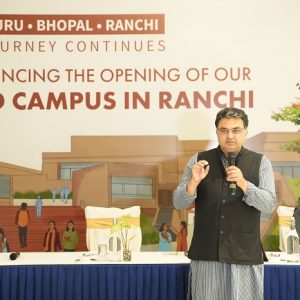Presently India is at a critical juncture in its agricultural policy, with policymakers facing constant pressure from pro-GM people to adopt GM maize. As per them, genetically modified crops will address food security and farming challenges in the country in a better way. On the surface, it might sound like a very good idea. But dig a little deeper, and the picture isn’t so rosy. These claims face significant opposition from scientists, environmentalists, and health experts, who express serious concerns about the long-term impacts on health, the environment, and food sovereignty. Yesterday, I came across a shocking news article in The New Indian Express reporting that a coalition of environmental activists from GM Free India had raised concerns about the illegal cultivation of genetically modified (GM) maize in Tamil Nadu and its presence in commercially sold processed foods and unprocessed maize grains across India.
They cited findings from a research study conducted by scientists at the Thanjavur-based National Institute of Food Technology, Entrepreneurship and Management (NIFTEM), under the Department of Food Biotechnology. The research, published in the renowned journal ScienceDirect, utilised standard ATR-FTIR and PCR-based methods to detect GM maize.
The study found that over 15% of tested samples confirmed GM traits through polymerase chain reaction (PCR) techniques. Further analysis revealed that approx. 20% of the samples bore functional similarities to standard GM maize. Despite strict regulatory prohibitions on GM crops in India, these findings suggest a clandestine entry of GM crops, possibly through illegal imports or leaks from experimental trials. Several Environmental activists and organizations like GM Free India have expressed serious alarm, calling this a severe regulatory lapse in our country.
These findings underscore the risks of introducing GM maize, which could jeopardize India’s agricultural heritage, food systems, and regulatory credibility. This isn’t just about breaking rules. It’s about endangering the health of our people, the future of our farmers, and the very soil we depend on. This moment underlines the urgency of science-based policies against GM maize that protect India’s agricultural legacy and food systems.
The Farmer at Risk
India’s agriculture is the backbone of its economy, supported primarily by small and marginal farmers. These farmers depend on traditional practices in farming like affordable inputs to sustain their livelihoods. Our country is home to various locally adapted maize varieties that have been cultivated by farmers for generations. The introduction of GM maize, which is controlled by multinational corporations through patents will threaten this balance by locking farmers into a cycle of purchasing expensive seeds annually, increasing their costs and dependency.
The cultivation of GM maize involves genetic modification to produce pesticides or resist herbicides, such as glyphosate. While these traits promise pest and weed control, they bring alarming risks. Studies have linked GM crops to allergies, environmental disruptions, and diseases like cancer. Glyphosate, widely used with GM crops, is associated with microbial resistance and toxicity.
Non-target species, including pollinators like bees, are also vulnerable, jeopardizing ecosystems and biodiversity. India’s past experience with Bt cotton has shown that these crops often fail to deliver promised yields, leaving farmers in financial distress. Furthermore, the introduction of GM maize threatens India’s diverse indigenous maize varieties, posing risks of cross-pollination and genetic contamination. This would erode genetic diversity, making crops less resilient to climate change and diseases.
Globally, there is growing consumer demand for GM-free foods, particularly in markets like Europe and parts of Asia. Several countries provide strong evidence that prioritizing non-GM agriculture is not only feasible but also advantageous for food security, biodiversity, and economic upliftment. In the European Union (EU), for instance, over 99% of maize production remains GM-free. The EU’s stringent regulatory framework reflects consumer preferences for non-GM foods and the government ensures that domestic agriculture aligns with environmental sustainability.
Favourable weather conditions in 2023 allowed the EU to produce 61.4 million tons of non-GM maize, meeting local demand while maintaining its reputation for safe, sustainable farming practices. Similarly, Brazil has carved out a significant export market for non-GM maize and soybeans, catering to regions like the EU, where GM free certification is a priority. India’s burgeoning health-conscious market also shows resistance to GM products. Embracing GM maize could alienate these consumers and tarnish India’s reputation as a provider of premium, sustainable produce.
A Sustainable Path Forward
India does not need GM maize to secure its agricultural future. Modern molecular breeding techniques offer safer and more effective alternatives. These methods have already been used successfully to develop high-yield, pest-resistant, and drought-tolerant crop varieties without the risks associated with GM technology. Public sector research institutions in India have a long history of innovation in sustainable agriculture. These institutions must refocus on developing low-input, high-yielding, and environmentally friendly maize varieties tailored to India’s unique agricultural conditions. Regulatory reform is also crucial. The Supreme Court’s directive for a national GM crop policy presents an opportunity to prioritize biosafety, environmental integrity, and farmer welfare.
Such a policy must be inclusive, transparent, and democratically shaped through consultations with farmers, scientists, environmentalists, and consumers. Robust monitoring mechanisms are essential to curb illegal GM crop cultivation and imports. Regular testing, strict biosafety enforcement, and penalties for violators are vital. Promoting non-GM certification and incentivizing sustainable farming practices can enable India to access lucrative domestic and international markets.
The illegal cultivation of GM maize in Tamil Nadu is a stark warning. It underscores the dangers of GM technology and the need for vigilant regulation. India’s policymakers must recognize that GM maize is not a panacea for agricultural challenges but a threat to biodiversity, farmer livelihoods, and public health. India has the potential to lead the world in sustainable agriculture by avoiding GM maize and embracing eco-friendly alternatives. Protecting our farmers, consumers, and ecosystems is not just an obligation—it is an opportunity to build a resilient and equitable agricultural economy.
Anything less would betray the trust of the nation and the aspirations of its people. It’s time for India to reaffirm its commitment to sustainability, ensuring that its agriculture remains a symbol of prosperity, health, and environmental harmony.














